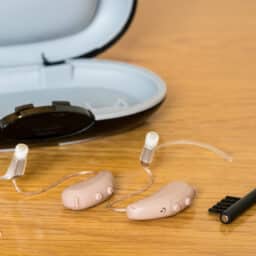Sleep and Tinnitus: Finding Relief on Long Winter Nights

Tinnitus can be annoying, distracting and debilitating, and this is especially true when you’re trying to go to sleep. The persistent sound becomes more noticeable at night, and, worse still, some people who do manage to drift off may be woken by their tinnitus. Find some relief and get the sleep you need with these…
Daily Habits That Help Maintain Long-Term Hearing Health

Over 37 million American adults, or approximately 15%, report that they have some trouble hearing. While hearing loss is sometimes inevitable, you can adopt small habits to slow or delay its progression and keep your ears in healthy shape for as long as possible. Wear Hearing Protection Noise-induced hearing loss is the second-most common cause…
Coping with Tinnitus in Maine’s Quiet Winter Months

We’re now in mid-winter; the bustle of the holidays is behind us, and now it’s time to enjoy the peaceful, cozy days of January. However, if you have tinnitus, the quiet days of winter can worsen your tinnitus symptoms, making it a challenge to enjoy these winter days. Here are some ways to cope with…
Hidden Hearing Loss: When Hearing Test Results Come Back Normal

Hearing tests are designed to reveal hearing loss and its progression: what you can hear and what you can’t. However, it’s becoming increasingly common that people get their hearing tested and have the results come back in normal hearing range, despite knowing that they have some difficulty hearing. What does this mean? The Blind Spot…
Motorcycles and Hearing Loss

You love the loud roar of your motorcycle engine and the thrill of riding down the highway, but have you ever considered the impact riding your motorcycle might have on your hearing health? Let’s discuss why motorcyclists are at an increased risk for hearing loss—not because we want you to stop riding your motorcycle, but…
Strategies for Managing Tinnitus at Work

Tinnitus is a frustrating, distracting condition; for many, it’s debilitating. Therefore, it can be a huge impediment to a productive day at work. According to the U.S. Centers for Disease Control and Prevention (CDC), about 8% of all workers in the U.S. suffer from tinnitus. If you’re one of them, you may be wondering how…
How Listening to Audiobooks Can Train Your Ears and Brain

Approximately 15% of all American adults report experiencing some degree of hearing trouble. While hearing loss is not always preventable, you can slow down the process by practicing listening and training your ears and brain. One way to do this is by listening to audiobooks. How Hearing Loss Occurs The most common type of hearing…
The Best Way to Dry Your Hearing Aids

You’re probably aware that you must keep your hearing aids away from water, but sometimes accidents happen. If you’ve gotten your hearing aids wet, don’t panic! There are methods to dry them; if you act quickly, you can prevent or lessen the water damage. Using a Hearing Aid Dehumidifier A hearing aid dehumidifier (sometimes called…
Hearing Protection During Hunting Season

Prolonged exposure to loud noises can result in permanent damage to our sense of hearing, and the crack of a gunshot is no exception. Unfortunately, many hunters overlook the importance of ear protection while out in the field, which can lead to significant damage to their ears as a result. How Does Loud Noise Damage…
Can I Improve My Hearing Health by Working Out?

Regular exercise is a key component of a healthy lifestyle, and it has significant benefits for physical and mental wellness. You may not realize it, but exercise can also reduce the risk of chronic diseases and various health conditions, including hearing loss. How Does Exercise Improve Hearing Health? The auditory system is intimately tied to…